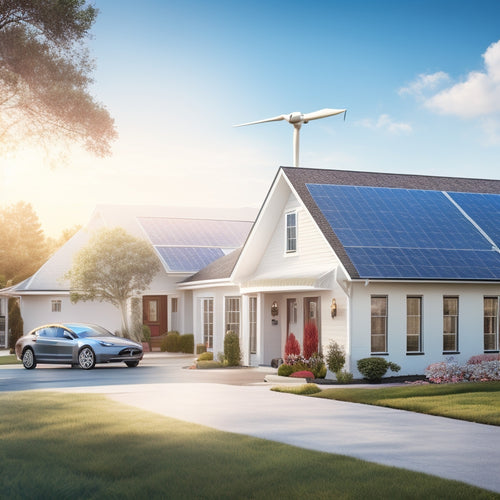
What Are the Best Solar Systems for Homes
Share
You're contemplating investing in a solar system for your home, but what makes a system truly exceptional? It starts with top-rated brands like SunPower, Panasonic, and LG Solar, which offer high-efficiency products and extensive warranties. Next, you'll need to determine the right system size and configuration to meet your energy needs. Inverters, which convert DC power to AC, are also essential, with string inverters being a popular choice. You may also want to take into account battery backup options, like lithium batteries, for added energy security. Finally, proper installation and maintenance are key to maximizing your system's performance and longevity - and that's just the beginning of optimizing your solar investment.
Key Takeaways
- Top solar panel brands like SunPower, Panasonic, and LG Solar offer high-efficiency products with extensive warranties for optimal performance and durability.
- System size and configuration directly impact energy production, so it's essential to assess energy usage patterns and consider professional installation for correct sizing.
- Inverters with high efficiency ratings above 98% maximize energy production, and options like string inverters, microinverters, and power optimizers cater to different needs and budgets.
- Battery backup options like lithium batteries store excess energy for nighttime use or during outages, and their capacity should align with specific energy requirements and solar incentives.
- Proper installation and regular maintenance are crucial for maximizing energy output, minimizing system failures, and ensuring long-term savings on energy bills.
Top Solar Panel Brands
When shopping for a solar system, the brand of solar panels you choose can greatly impact the performance, durability, and overall value of your investment.
Top solar panel brands offer high-quality products that guarantee maximum energy output and longevity. You should look for brands that provide extensive solar panel warranties, typically ranging from 25 to 30 years, which cover defects, performance, and labor.
Reputable brands also offer competitive pricing, making solar energy more accessible and affordable. Additionally, some brands are eligible for solar energy incentives, such as tax credits and rebates, which can greatly reduce the upfront cost of your solar system.
Leading brands like SunPower, Panasonic, and LG Solar offer premium products with high-efficiency rates, assuring you get the most out of your solar investment.
System Size and Configuration
With your solar panel brand selected, it's time to contemplate the system size and configuration that's right for your home. This critical step directly impacts your system's performance and ability to meet your energy consumption needs.
To determine the ideal system size, you'll need to assess your energy usage patterns, considering factors like your home's size, insulation, and appliances. A larger system will generate more electricity, but it may not be necessary if you have relatively low energy consumption.
A typical residential solar system ranges from 3 to 10 kilowatts (kW), with the average being around 5-6 kW.
When configuring your system, consider the number of panels, their wattage, and the layout on your roof. A well-designed system will optimize energy production while minimizing costs.
It's important to work with a professional installer to verify your system is correctly sized and configured to meet your specific energy needs. This will ensure you're getting the most out of your investment and maximizing your return on investment.
Inverter Types and Efficiency
You've determined the ideal system size and configuration for your home; now it's time to focus on the inverter, a critical component that converts the DC power generated by your solar panels into AC power for your home.
When selecting an inverter, you'll encounter different types, each with its own strengths and weaknesses. String inverters are the most common, offering a cost-effective solution with high efficiency ratings. Microinverters, on the other hand, provide more granular control and monitoring at the panel level, but at a higher cost. Power optimizers offer a middle ground, allowing for panel-level monitoring while still using a central inverter.
Regardless of the type, inverter technology has evolved markedly in recent years, with many modern inverters boasting efficiency ratings above 98%. Look for inverters with high efficiency ratings, as they can maximize your system's energy production.
Additionally, consider inverters with advanced features such as monitoring, grid support, and safety features. By choosing the right inverter for your system, you can guarantee reliable, efficient, and safe energy production for years to come.
Battery Backup Options
One essential aspect to take into account when designing a solar system is the ability to store excess energy generated during the day for use during the night or power outages. This is where battery backup options come into play.
You'll want to contemplate lithium batteries, which offer high energy density and long lifetimes. They're a popular choice for home solar systems due to their reliability and low maintenance requirements.
When selecting a battery backup system, you should reflect on your energy needs during a power outage. Will you need to power only essential appliances like refrigeration and lighting, or do you want to keep your entire home up and running?
The size and type of batteries you choose will depend on your specific requirements. Additionally, be aware of solar incentives that may be available in your area, such as rebates or tax credits, which can help offset the cost of a battery backup system.
Installation and Maintenance
As solar panels become an integral part of your home's energy infrastructure, proper installation and maintenance are essential to guarantee peak performance and longevity.
You'll want to verify that your solar system is installed correctly to maximize energy output and reduce the risk of system failures.
When considering installation, keep in mind the following key factors:
-
Installation timeline: The installation process typically takes a few days to a few weeks, depending on the complexity of the system and the size of your home.
-
Cost considerations: While the initial investment in a solar system may seem intimidating, consider the long-term savings on your energy bills and potential increases in your home's value.
-
System monitoring: Regular monitoring of your system's performance helps identify potential issues before they become major problems.
- Regular cleaning and maintenance: Scheduling regular cleanings and maintenance checks guarantees your system operates at peak efficiency and extends its lifespan.
Frequently Asked Questions
Can I Install Solar Panels on a Metal or Clay Tile Roof?
Installing solar panels is like maneuvering through an obstacle course, and you'll need to clear the first hurdle: ensuring your metal or clay tile roof is compatible. You'll need to meet specific installation requirements, including secure fastening systems and waterproofing, to guarantee a seamless and efficient energy harvest.
How Do Solar Panels Perform During Heavy Snowfall or Hail?
You'll be relieved to know that solar panels are designed to withstand heavy snowfall and hail; however, snow accumulation can reduce energy efficiency, so it is crucial to install a system with a suitable tilt and maintenance plan to minimize impact.
Are Solar Panels Covered Under Homeowner's Insurance Policies?
You'll be relieved to know that your solar panels are typically covered under your homeowner's insurance policy, which means you're protected in case of damage or theft, and can file insurance claims for solar panel coverage if needed.
Can I Sell Excess Energy Back to the Utility Company?
You can sell excess energy back to the utility company through net metering, earning energy credit options that offset your bill, and in some cases, even receive a cash payout for surplus generation.
Do Solar Panels Increase My Property Value?
You're likely to see a significant increase in property value, like the California homeowners who saw a $15,000 rise after installing solar panels, thanks to the added energy efficiency and eco-friendly appeal that solar systems bring.
Related Posts
-

10 Best Solar Panel Options for Motorhomes Online
When choosing the best solar panel for your motorhome, consider factors like efficiency, durability, and design. You'...
-

Why Homeowners Are Embracing DIY Energy Independence
By taking control of your energy needs, you're breaking free from the uncertainty of utility bills and embracing a se...
-

10 Tips for Cleaner City Air With Scooters
By adopting a few simple habits, you can make a significant impact on reducing city air pollution with your scooter. ...


